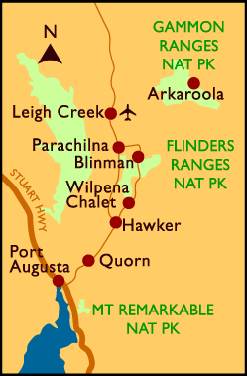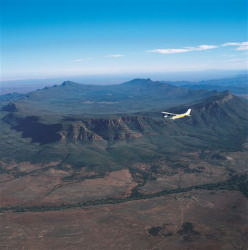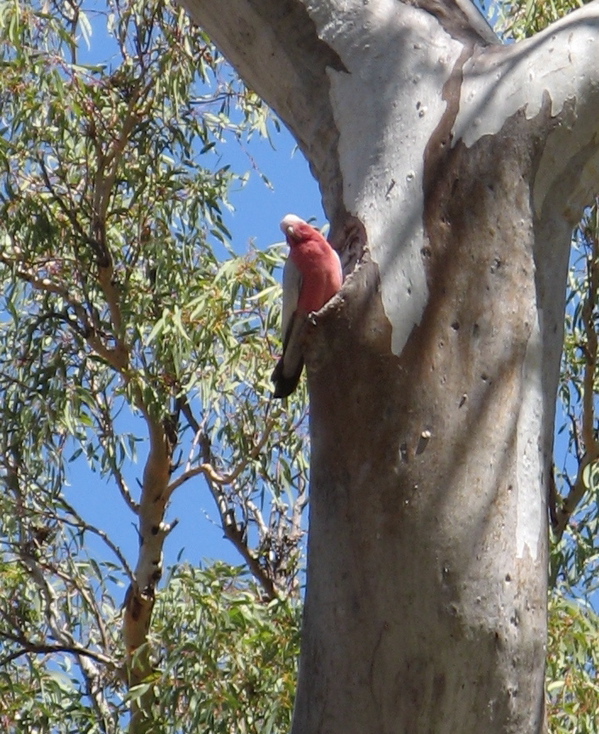Camping Trip: Mt. Remarkable and Flinders Ranges
We borrowed Ruth and Graham's car and
took a trip north (about five hours) to the Flinders Ranges, a spectacular geological marvel. We
were in two National Parks during our trip: Mt. Remarkable National Park and
Flinders Ranges National Park. Flinders Ranges includes an
amazing geographic feature called "Wilpena Pound" (pictured below) that
is about 10.5 miles long and 5 miles wide. Surrounding it is dry
desert-like land, while inside is relatively fertile and green. We were not
expecting much in the way of plant growth or flowers due to the severe
drought that Australia is experiencing, but it is a beautiful place any
time of year.




Mt. Remarkable: Hike to Hidden Gorge
Mt. Remarkable National Park is about 3
hours north of Adelaide, but a world away. There are
approximately 115 species of birds and we experienced their beautiful
sounds each day, especially on the hikes where "human" noise was at a
minimum. We arrived early afternoon and decided to take a long
hike (18km) to Hidden Gorge. We walked in and along the river bed (bone
dry as you can see in the left photo), and were craning our necks
continuously to take in the sights of the gum (and other) trees against
the red rock faces. The gorge itself narrows to about a 10 foot
wide opening (bottom right) and then opens back out. Along the
way we came across kangaroos (who hop up and down the cliff faces at
full speed) and a family of emus (more on them later) that enhanced the surroundings.
We took a short hike early the next
morning around Davy's Gully where kangaroos and wallabies were out in
full force finishing off their night of eating. They were all
shapes and sizes, but we were especially enamored with the variety of
colors of their fur. Also, there were plenty of little ones
around - in and out of Mums' pouches - an extra special treat to
start our day. We then drove up to Flinders Ranges.
Flinders Ranges: Hike to Bunyeroo Gorge
We arrived in the early afternoon and took a long hike along Bunyeroo gorge. It was hot and very dry, and we were swarmed by voracious flies. But the scenery made up for it, and we saw lots of animals, including emus, kangaroos, wallabies, euros (a type of kangaroo), and of course lots of birds - cockatoos, parrots, kookaburras, magpies.
Flinders Ranges: Hike in Wilpena Pound
We camped overnight near Bunyeroo Gorge and then drove back down to Wilpena for another long hike, this time across and along the inside of the Pound, a 24km hike, to Edeowie Gorge, and Malloga Falls (which were, of course, bone dry).Flora and Fauna
The afternoon we arrived, within about 10 minutes of starting our first hike out, we
heard a loud rustling sound next to the path. Given the number of
poisonous snakes in Australia, Elyse was not thrilled by this.
But a goanna (large lizard below) was the source of the noise, and he was fun to
look at. He was pretty big (see Elyse's leg for perspective), but
moved slowly (and away from us).
The galah (on the left) was a common sight at Mt. Remarkable. They are often seen in flocks, and have a loud call (squawk)
that awakened us most mornings. The parrot on the right has
iridescent blue wings that are shockingly beautiful when they fly.
This wedge-tailed eagle was one of many that we saw, but this one
came the closest to us. This kookaburra was kind enough to stay
still for a close-up the morning we were leaving. They have a
call that sounds a bit like a monkey's "laughing" - it's hard not to join
in with at least a smile!

Over the weekend we saw many kangaroos,
wallabies and euros (no, we wouldn't be able to tell you which is which
most of the time). You can see a joey's head sticking out of his
mum's pouch on the left (dad is a "big red" kangaroo - they can grow to
be 6 feet tall!), while the family on the right was kind enough to look
at the camera.
If you are familiar with the Australian
coat of arms (we have provided
an image of it for those of you who are not), you will notice that we
were able
to recreate it (sort of) in the photo below: the kangaroos are under
the tree,
while the emu was walking toward them. We saw another emu with
his 7(!) chicks (dad emus take care of the young 'uns). Young emus have
bright stripes and are very
cute to watch walk and run/waddle. Elyse learned on her first
encounter (years ago) to stay away from a dad emu with his chicks -
that emu puffed up to about double his size and was on his way toward
her within seconds of her getting out of the car for a photo op! No
problems this time....

The gum trees were, once again, one of
the highlights of the walks. Their shapes and colors are a
constant source of wonder. The one on the left shows another
interesting characteristic: while a good portion of a tree's
trunk may be dead (usually burned out in a bush fire), the rest of the
tree continues to grow as if nothing is missing. This can be a
bit disconcerting if you're walking near one that seems precariously
perched, but it is truly amazing to see. The close up of the bark
shows the colors that are commonly seen, while the varying sunlight can
have an impact on the colors as well.